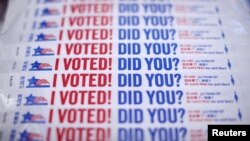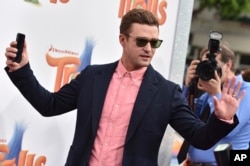“What we’re trying to do is an introductory guide to voting,” says Erika Reinhardt of VotePlz, a tool designed to help people check their voter registration, learn about their voting rights, and even check whether their state gives people time off to vote.
The app is meant to educate first-time voters through a process with which they are familiar — their mobile devices. Young people are interested in voting, Reinhardt said, but as first-timers, some need help figuring out how it all works.
Watch: Obama Urged North Carolinians to Vote
VotePlz staffers say more than 250,000 people have used the app to check their registration, and 75,000 have used the service to register to vote since it made its debut earlier this year.
VotePlz is one of many efforts around the nation to get people to vote in the November 8 election, either by turning out in person to cast a ballot, or by voting early or absentee.
Latino-targeted app
Another mobile app, Phone2Action, is helping Maria Patricia Corrales, founder of a Latino cultural association in Washington, work with Latino communities nationwide to get out the vote.
The app provides a grassroots advocacy platform to help groups create multimedia campaigns, communicate with lawmakers, and track their progress in real time.
Corrales says there are about 160,000 people involved in the Latino get-out-the-vote effort she works on. In recent weeks, much of that effort has been focused on getting people registered to vote.
“We’re not telling them how to vote,” Corrales said. “We just say ‘make sure you do your duty.’”
Rock the Vote is another group working to help educate people and get them out to the polls. Like VotePlz, Rock the Vote reaches out to young people, but the first people targeted by this 26-year-old group may now have voting-age teenagers themselves.
While the group’s outreach has moved from television to the internet, the mode of operation remains the same: harnessing celebrity power to motivate people to get involved in politics and civic action.
In the days before the internet, Rock the Vote got attention with televised public service announcements and large-scale music events. Now, says Jesse Moore, vice president for civic engagement, one of the group’s major missions is developing and supporting online content to get people’s attention.
“In the early ’90s,” Moore says, “before there were 500 channels, MTV was a great place to get the message out. Now it’s a more complicated effort that requires shareable videos, Twitter, Facebook and a variety of approaches.”
Celebrity star power
The approaches range from comedy, such as a video starring pop star Katy Perry attempting to vote naked, to serious treatments of issues such as criminal justice reform, gun violence and LGBT issues.
Other celebrities also have gotten into the arena, hoping to influence fans with videos, tweets and snapshots on social media.
The cast of the smash Broadway show Hamilton posted a video of them singing a popular tune from the show, with the lyrics changed to urge fans to vote. The stars of a popular television comedy, Will and Grace posted a video, more than 10 years after the show’s last episode, in which their characters discuss the present day election. A group of HBO stars came together for a video titled “Use Your Voice. Use Your Vote.”
And Avengers director Joss Whedon assembled a video using a number of his cast members from that and other projects, promising whimsically that if people vote, one of the actors will do a nude scene in his next movie. (The joke: the actor in question feigns surprise when he hears this news.)
Pop star Justin Timberlake made waves when he photographed himself casting an early ballot in his home state of Tennessee last month. Some U.S. states allow people to photograph their ballots, but it turns out that Tennessee is not one of them. State authorities said they had no plans to prosecute.
What works
Yet, with all the efforts to get people to turn out for Tuesday’s election, researchers at Stanford University say it takes more than technology and publicity stunts to get reluctant voters to the polls. The study published in 2008 says people are more likely to vote if they are encouraged to make voting part of their identity: “be a voter” rather than “go vote.”
The experts also said people are more likely to go to the polls when they are told that turnout will be high, meaning they will be following a social norm. Conversely, being told voter turnout will be low makes uncertain voters less likely to vote.
Researchers who questioned people about their voting plans also found that people who are expecting to be asked follow-up questions after the election are more likely to go and vote — meaning they are more motivated when they expect to be held accountable for their actions.
Finally, Yale University’s Institution for Social and Policy Studies has found that people seeking to motivate voters need to ask more than “are you planning to vote.” They got better results when they asked the potential voter to describe his or her plans for working their voting into their day — when they would do it and how they would get to the polling place.
Whatever their method, advocates urging people to vote are saying it is more important this year than ever before, no matter which candidate one chooses.
“We’re not out to change anyone’s mind [about the candidates],” said Erika Reinhardt of VotePlz. “We’re trying to make the process as friendly and easy as possible.”







